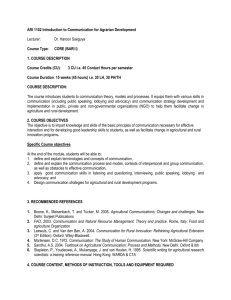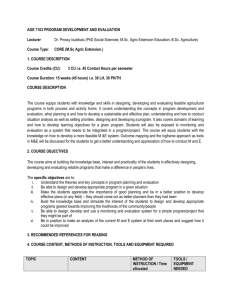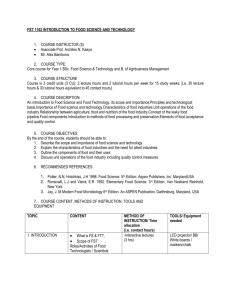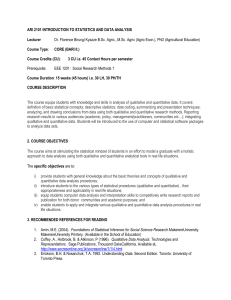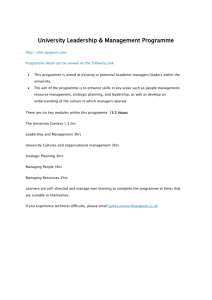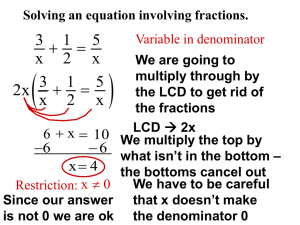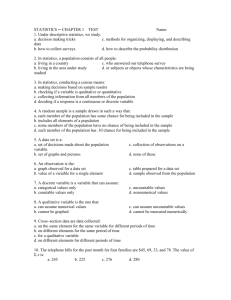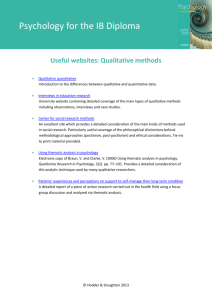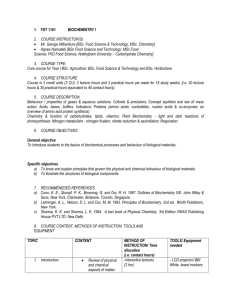EEE 3201 SOCIAL RESEARCH METHODS 1
advertisement
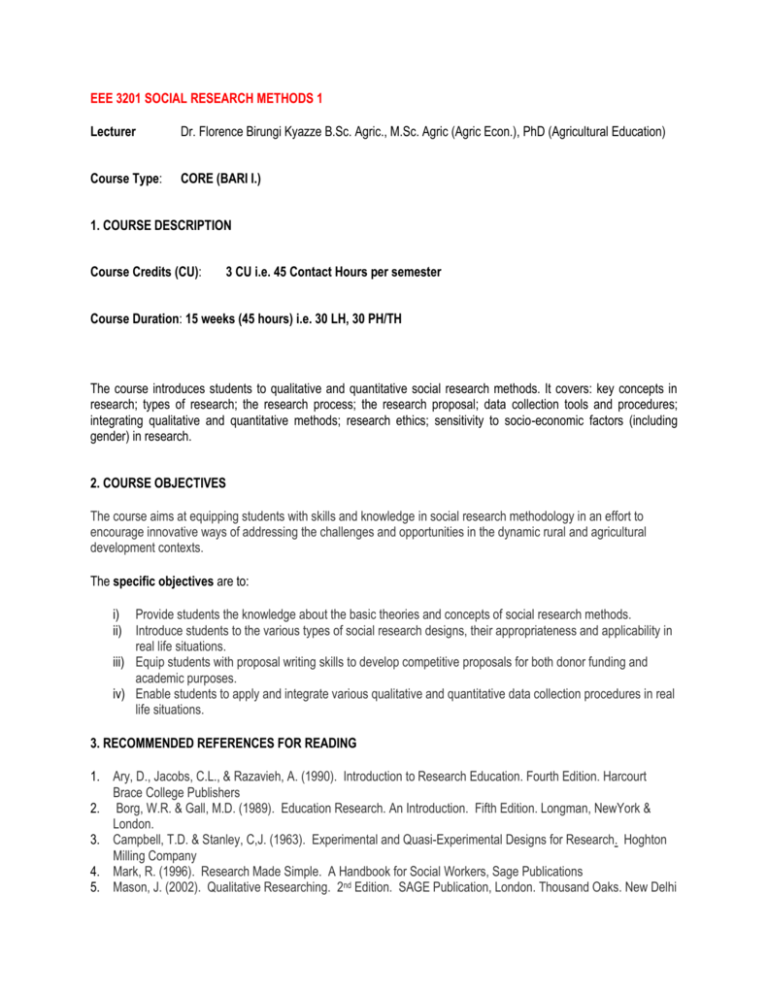
EEE 3201 SOCIAL RESEARCH METHODS 1 Lecturer Dr. Florence Birungi Kyazze B.Sc. Agric., M.Sc. Agric (Agric Econ.), PhD (Agricultural Education) Course Type: CORE (BARI I.) 1. COURSE DESCRIPTION Course Credits (CU): 3 CU i.e. 45 Contact Hours per semester Course Duration: 15 weeks (45 hours) i.e. 30 LH, 30 PH/TH The course introduces students to qualitative and quantitative social research methods. It covers: key concepts in research; types of research; the research process; the research proposal; data collection tools and procedures; integrating qualitative and quantitative methods; research ethics; sensitivity to socio-economic factors (including gender) in research. 2. COURSE OBJECTIVES The course aims at equipping students with skills and knowledge in social research methodology in an effort to encourage innovative ways of addressing the challenges and opportunities in the dynamic rural and agricultural development contexts. The specific objectives are to: i) Provide students the knowledge about the basic theories and concepts of social research methods. ii) Introduce students to the various types of social research designs, their appropriateness and applicability in real life situations. iii) Equip students with proposal writing skills to develop competitive proposals for both donor funding and academic purposes. iv) Enable students to apply and integrate various qualitative and quantitative data collection procedures in real life situations. 3. RECOMMENDED REFERENCES FOR READING 1. Ary, D., Jacobs, C.L., & Razavieh, A. (1990). Introduction to Research Education. Fourth Edition. Harcourt Brace College Publishers 2. Borg, W.R. & Gall, M.D. (1989). Education Research. An Introduction. Fifth Edition. Longman, NewYork & London. 3. Campbell, T.D. & Stanley, C,J. (1963). Experimental and Quasi-Experimental Designs for Research. Hoghton Milling Company 4. Mark, R. (1996). Research Made Simple. A Handbook for Social Workers, Sage Publications 5. Mason, J. (2002). Qualitative Researching. 2nd Edition. SAGE Publication, London. Thousand Oaks. New Delhi 6. Sarantakos, S. (1998). Social Research, 2nd Edition, MacMillan Press Ltd 7. Sudman, S. & Bradburn, M.N. (1982). Asking Questions. A Practical Guide to Questionnaire Design. JossyBass Inc., Publishers. 4. COURSE CONTENT, METHODS OF INSTRUCTION, TOOLS AND EQUIPMENT REQUIRED TOPIC CONTENT METHOD OF TOOLS / INSTRUCTION / Time EQUIPMENT allocated NEEDED Introduction to Social Research Discussion of course overview What is Research? Why should you study Social Research? Characteristics Of Social Research Basic Terminology in Social Research Ethical consideration in social research Source of knowledge for social research The nature of science and the scientific inquiry Interactive lectures (5hrs) Basic vs Applied research Exploratory vs Confirmatory research Qualitative vs Quantitative research Differences between qualitative and quantitative research Interactive Lectures (2hrs) Types of Social Research Tutorial sessions (2hrs) Flash cards, Markers White Board, Laptop, LCD Projectors, Paper Flash cards, Markers White Board, Laptop, LCD Projectors, Paper Types of social research design and their characteristics: Quantitative Research Design-Nonexperimental Design Interactive Lectures (4hrs) 1. Types of descriptive research Types of social research and their characteristics i) ii) iii) iv) v) Survey research Longitudinal Studies Correlational research Case studies Ex posto facto research 2. Experimental Research General characteristics of experimental research ii) Purpose of experimental research iii) Types of experimental research Paper Interactive Lectures (3hrs) i) Introduction to Research Designs Research Qualitative in Social Planning for the Research Process Elements of the Research Proposal Phenomenology qualitative Designs Ethnography qualitative designs Grounded theory qualitative designs Case study qualitative designs Tutorial sessions (3hrs) Interactive Lectures (2hrs) Tutorial sessions (2hrs) Interactive Lectures Requirements for the research (3hrs) process The research proposal as a planning tool Purpose of the proposal Title page and table of contents Components of the title page Characteristics of a good title What is a table of contents? Markers White Board, Laptop, LCD Projectors Interactive Lectures (2hrs) Markers White Board, Laptop, LCD Projector, Desktop computers Markers White Board, Laptop, LCD Projector, Desktop computers Markers White Board, Laptop, LCD Projector, Desktop computers Markers White Board, Laptop, LCD Projector, Desktop computers Elements of the Research Proposal Chapter 1: Introduction i) Background and setting of the research problem Statement of the research problem Objectives and hypotheses Significance of the study Definition of terms Limitations of the study Basic assumptions ii) iii) iv) v) vi) vii) Elements of the Research Proposal Elements of the Research Proposal Tutorial Sessions (5hrs) Chapter 2: Review of Related Literature Interactive Lectures (4hrs) i) ii) iii) iv) v) vi) vii) What is Literature Review? Functions of Literature Review Sources of Literature Review Selecting related literature Reporting related literature Reviewing the selected literature Writing up the Reviewed Literature Tutorial sessions (3hrs) Chapter 3: Methodology Computer Laboratory (4hrs) Interactive Lecture (5hrs) Role of the Research Methodology Components of the research methodology i) Research Design ii) Target Population iii) Sampling and sample selection iv) Sampling Errors and the Causes v) Data collection techniques and tools vi) Quantitative Data Collection tools vii) Qualitative data collection tools viii) Integrating qualitative and quantitative data collection tools ix) Data analysis x) Budget xi) Work plan xii) Bibliography xiii) Appendices 5. SUMMARY OF TIME NEEDED Interactive Lectures (4hrs) Tutorial session (5hrs) Field Based Data collection exercise (6hrs) Markers White Board, Laptop, LCD Projector, Markers White Board, Laptop, LCD Projector Desktop computer Internet services Markers White Board, Laptop, LCD Projector, Interactive lectures covering theory 30 hrs Tutorial Hours 20hrs Computer Laboratories 10 hrs 6. OVERALL COURSE EVALUATION Continuous Assessment Test 30% Take Home and Field Based Assignments 10% Final examination 60%.
